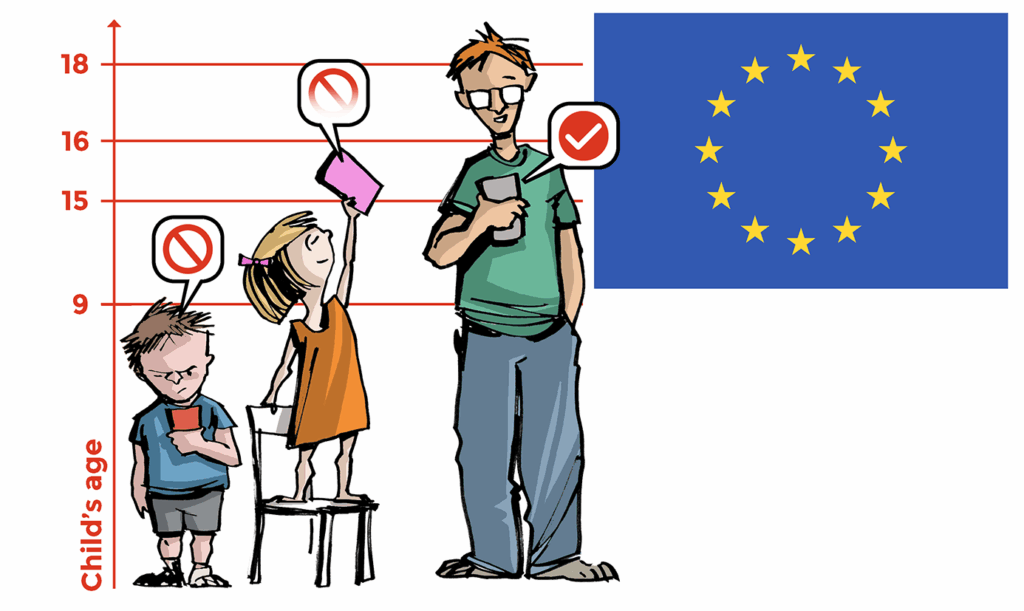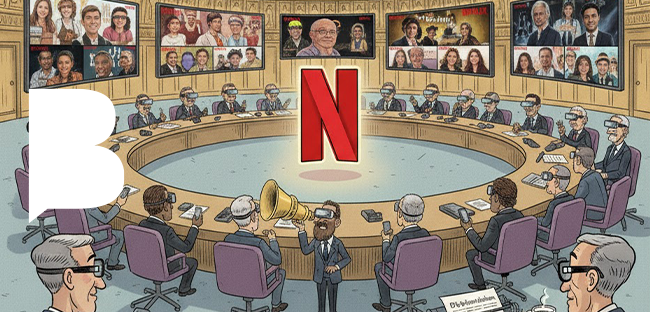
10 – 17 October 2025
HIGHLIGHT OF THE WEEK
EU moves on kids’ social media: Verify, don’t ban
EU ministers met in Horsens, Denmark (9–10 October), amid an intensifying debate on how young people should use social media. The Danish presidency tabled the Jutland Declaration, a political push for stronger protections that puts age verification at the centre of online safety for minors. Ministers endorsed firmer enforcement of the Digital Services Act (DSA), signalled support for interoperable, privacy-preserving age checks, and floated the idea of a ‘digital majority’ discussion, while stopping short of endorsing one uniform minimum age across the block.
The declaration argues that platforms accessible to minors must ensure ‘a high level of privacy, safety, and security’ and that effective age verification is ‘one of the essential tools’ to curb exposure to illegal or harmful content and manipulative design. It explicitly backs EU-wide solutions tied to the European Digital Identity (EUDI) Wallet, positioned as a way to verify age with minimal data disclosure, and calls out addictive features (infinite scroll, autoplay, streaks) and risky monetisation (certain loot boxes, micro-transactions) for tighter controls. The text also stresses ‘safety-by-design’ defaults, support for parents and teachers, and meaningful participation of children in the policy process.

Two days later, ministers backed the Danish plan in part: countries rallied behind the common EU layer for age verification but resisted a single EU-wide age limit. The emerging compromise is to standardise ‘how to verify’ at the EU level while leaving ‘what age to set’ to national law, avoiding fragmentation of technical systems while respecting domestic choices. Pilots for the EU approach are expanding in several member states and align with the EUDI Wallet rollout due by the end of 2026.
Denmark also proposed a national ban on social media for under-15s, which sharpened the conversation. Several governments favoured stricter child-safety enforcement and robust age checks over outright prohibition. Still, Copenhagen’s initiative raised the political stakes and accelerated a broader European rethink of youth online protections.
Regulatory pressure is rising in parallel. Over the past week, the European Commission sent fresh DSA information requests to major platforms, including Snapchat, YouTube, Apple and Google, probing how they keep minors away from harmful content and how their age-assurance systems work. The probe follows the Commission’s final DSA guidelines on protecting minors issued in July, which spell out ‘appropriate and proportionate’ measures for services accessible to minors (Article 28(1) DSA), from default privacy safeguards to risk mitigation for recommender systems. Violations can lead to substantial fines.
The policy trade-offs now come into clearer focus. Effectiveness hinges on high-assurance age checks that are hard to spoof yet privacy-preserving enough to avoid building new identity honeypots. The EUDI Wallet architecture promises selective disclosure, proving you’re over 16 without handing over full identity, if implemented with strict data-minimisation and independent certification. Feasibility depends on broad industry uptake, SME-friendly compliance, and cross-border interoperability, so a teen’s age attestation works the same in Lisbon and Ljubljana, for instance. Rights impacts will be judged on due process, appeal mechanisms, and transparency of any access restrictions, especially where national rules set higher age bars than platform terms.
Globally, lawmakers are testing bolder moves with mixed feasibility. Australia’s incoming ban on social media for under-16s illustrates the enforcement dilemma: platforms aren’t required to verify age; instead, they must infer it using AI and behavioural signals, an approach Google told a parliamentary hearing will be ‘extremely difficult’ to police and may not make children safer. The EU’s diverging bet is that verifiable, privacy-respecting age checks, combined with safety-by-design and content rules, can reduce harm without a blanket prohibition.
What to watch next is execution: the Commission mandate to build the EU layer for age verification; publication of impact assessments that weigh safety gains against privacy risks; and the expansion of national pilots toward the EUDI Wallet’s end-2026 deadline. In the meantime, DSA enforcement actions and any national moves like Denmark’s proposed under-15 ban will test how far Europe is willing to go to reduce minors’ exposure to harmful content and addictive design without overreaching on surveillance or excluding young people from legitimate online participation.
Why this matters
A common EU age-verification layer paired with national discretion on age limits could be Europe’s most consequential shift in minors’ online safety since the DSA: it promises fewer loopholes for harmful content and design, clearer obligations for platforms, and a privacy-by-design path via the EUDI Wallet. Whether it succeeds will depend on rigorous technical standards, credible oversight, and careful calibration between protection, privacy, and children’s rights to information and participation.
IN OTHER NEWS THIS WEEK
Chips and sovereignty: Controls tighten while orders surge
ASML heads into earnings on a wave of multi-billion-dollar AI ‘megadeals,’ with analysts expecting a sharp pickup in new bookings as customers expand 2026+ capacity, another sign that the datacenter build-out is reshaping chip-equipment demand. At the same time, China is reportedly tightening customs checks on Nvidia’s China-market AI processors at major ports, underscoring how export controls and counter-measures are now a permanent feature of the supply chain. In Europe, The Hague took the unusual step of invoking the Goods Availability Act to steady governance at Nexperia, citing risks to economic security. And Taipei downplayed the impact of Beijing’s rare-earth curbs, saying Taiwan can source most needs elsewhere. The throughline: expanding orders on one end, more state intervention and scrutiny on the other.
New guardrails: From California chatbots to EU–OpenAI talks
Regulators are sharpening the rulebook around AI and platforms. California adopted the first dedicated ‘AI chatbot safety’ law, adding disclosure and safety expectations for conversational systems. In the UK, competition authorities moved against Google over market dominance questions, signalling continued antitrust heat on Big Tech. Brussels, for its part, opened a structured dialogue with OpenAI on fair and transparent development practices, while Tokyo pushed a domestic-AI drive framed as a national-security priority. Together, the steps point to a patchwork tightening: safety standards, competition remedies, and security-led industrial policy advancing in parallel.
AI infrastructure goes global: Public–private builds accelerate
Big checks and unusual pairings defined infrastructure news. Google pledged USD 15 billion to supercharge India’s AI stack, compute, subsea capacity, and developer support, aiming to broaden access and local capability. In a separate lane, Google and the World Bank announced a partnership to help governments stand up AI-enabled public infrastructure (think service delivery and data platforms). And in the Southern Cone, Brazil said construction on a TikTok data centre will start within six months, a bet on localisation amid rising scrutiny of where data lives and who can access it. The momentum suggests AI and platform infrastructure are becoming tools of development policy, not just corporate capex.
Frontier science: A teleportation step that matters
Oxford researchers reported a milestone in quantum teleportation, improving the reliability of moving quantum states between distant nodes. While the phrase sounds sci-fi, the advance is about plumbing: lower-error links are what future quantum networks will need for secure communications and distributed computing. In practical terms, this kind of lab-to-prototype progress is what will determine whether quantum networking can scale beyond carefully curated experiments.
LOOKING AHEAD

16th Session of the UN Conference on Trade and Development (UNCTAD16)
The 16th Session of the UN Conference on Trade and Development (UNCTAD16) will take place from 20 to 23 October 2025 in Geneva. Hosted by Switzerland, it will gather heads of state, ministers, international organisations, business leaders, academics, and civil society under the theme ‘Shaping the future: Driving economic transformation for equitable, inclusive and sustainable development.’
With over 40 high-level sessions, the conference will delve into trade, investment, technology, and sustainable growth. A key outcome will be defining UNCTAD’s mandate and policy direction for the next four years.
Global Cyber Conference 2025
The Global Cyber Conference returns for its 4th edition, once again gathering senior cybersecurity stakeholders, decision-makers, public authorities, and academia from across the globe. It provides a robust networking and learning platform to gain a shared understanding of what must be done to strengthen cyber resilience. The program is now structured around four main steps: Global Risks, Governance, Hands-on Resilience, and Future-ready Strategies. Each step is covered in depth to offer attendees comprehensive knowledge, practical use cases, and critical tools to effectively address the challenges facing their organisations.
Singapore International Cyber Week
Singapore International Cyber Week (SICW) returns to the Sands Expo and Convention Centre on 20–23 October 2025, marking its milestone 10th edition under the theme “Shaping the Next Era of Global Cybersecurity.” Organised by Singapore’s Cyber Security Agency, SICW is the Asia-Pacific’s most established policy forum, bringing together ministers, regulators, industry leaders and researchers for high-level dialogues, bilateral meetings and capacity-building sessions; it runs alongside the GovWare Conference & Exhibition (21–23 Oct), the anchor trade event drawing 13,000+ participants. If your work touches cyber diplomacy, norms, critical infrastructure or public–private cooperation, this is the region’s key week to watch and engage.
Diplo will be present at this conference through the Geneva Dialogue on Responsible Behaviour in Cyberspace, an initiative launched in 2018 by the Swiss Federal Department of Foreign Affairs (FDFA) and implemented by DiploFoundation, with the support of the Republic and State of Geneva, C4DT, and UBS. The Geneva Dialogue is organising a session on 21 October, which will present the Geneva Manual on Responsible Behaviour in Cyberspace, exploring the evolving roles and responsibilities of all stakeholders in implementing cyber norms and confidence-building measures for critical infrastructure protection. It draws on the Geneva Manual’s latest chapter, which translates high-level commitments into practical guidance for action in today’s complex threat environment.
LAST WEEK IN GENEVA and at the UN
Geneva Peace Week 2025 | Geneva
The 2025 edition of Geneva Peace Week will bring together peacebuilders, policymakers, academics, and civil society to discuss and advance peacebuilding initiatives. The programme covers a wide range of topics, including conflict prevention, humanitarian response, environmental peacebuilding, and social cohesion. Sessions this year will explore new technologies, cybersecurity, and AI, including AI-fueled polarisation, AI for decision-making in fragile contexts, responsible AI use in peacebuilding, and digital approaches to supporting the voluntary and dignified return of displaced communities.
GESDA 2025 Summit | Geneva
The GESDA 2025 Summit brings together scientists, diplomats, policymakers, and thought leaders to explore the intersection of science, technology, and diplomacy. Held at CERN in Geneva with hybrid participation, the three-day programme features sessions on emerging scientific breakthroughs, dual-use technologies, and equitable access to innovation. Participants will engage in interactive discussions, workshops, and demonstrations to examine how frontier science can inform global decision-making, support diplomacy, and address challenges such as climate change and sustainable development.
WSIS+20 review process | Online and New York
This has been a busy week for those involved in or following the WSIS+20 review process. On Monday and Tuesday, the co-facilitator hosted online consultations with stakeholders and member states, who were invited to provide comments on the zero draft (the very first version of the WSIS+20 review outcome document). On Wednesday, the second preparatory meeting offered another opportunity for member states and observers to share their views and expectations on both the zero draft and the overall review process. And starting informal negotiations started on Thursday; they continue today (Friday), as well as on Monday and Tuesday next week. As these discussions are unfolding, we invite you to take a look at the written inputs submitted in response to the zero draft; they may give you a sense of what to expect during the negotiations.
You can also follow the WSIS+20 review process – and dive deep into its background – on our dedicated page on the Digital Watch Observatory.
READING CORNER
Why does form matter? Aldo Matteucci explores how shapes – of words, ships, and states – carry meaning. From rhetoric to Chinese junks to the modern border, structure tells its own story.
When did diplomacy start? Earlier than we think. We don’t know the exact moment diplomacy began, and we probably never will. But we can say, with high
Smart cities promise efficiency but risk surveillance and algorithmic bias. Discover how we can build human-centered cities where AI serves people, not just systems.
They don’t talk treaties; they talk APIs. Discover how tech ambassadors are navigating the complex relationship between cities and big tech.
Discover the surprising link between streaming and statecraft. This analysis breaks down how Netflix content influences foreign policy, cultural diplomacy, and global power structures.
Billions chase AI’s promise while profits hide in the server room, drowned by power bills, depreciation, and unrealistic goals.







